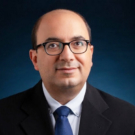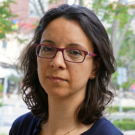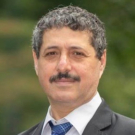Speakers

Sami Abu Shehadeh
Former Member of the Israeli Knesset, Palestinian Historian, Politician and Leader of Balad Party

Suhad Bishara
Legal Director and Director of the Land and Planning Rights Unit, Adalah: The Legal Center for Arab Minority Rights in Israel

Jafar Farah
Director, Mossawa Center - The Advocacy Center for Arab Citizens in Israel

Aida Touma-Suleiman
Member of the Israeli Knesset since 2015 (HADASH); Journalist and Politician; Founder & CEO of Women Against Violence
Moderator
About the Webinar
In the immediate aftermath of Hamas’ October 7, 2023, surprise attack that stunned Israel with its startling breadth, military impact, and timing, Prime Minister Benjamin Netanyahu immediately declared war on the organization and vowed to inflict an “unprecedented price” on it, its political allies, and their followers. Since then, Israeli leaders took turns pledging to dismantle Hamas, destroy its military capabilities, and ensure that the Gaza Strip “would never look the same.”
However, Israel’s war of retaliation against Hamas quickly morphed into a war of collective vengeance against the Palestinian people in Gaza and beyond. A second front slowly emerged in the occupied West Bank where violent clashes between Israeli troops and armed settlers and local Palestinians escalated to a degree unseen in years. In addition, a third front of a kind has developed quietly without attracting much attention in international media and think tank research that is focusing entirely on the dramatic and ferocious battles raging inside Gaza. The reference here is to the political crackdown taking place inside Israel where the already limited space for civil liberties and freedom of speech and expression for Palestinian Arabs has been severely limited in the heat of the battle being waged in Gaza.
This webinar will focus on the direct impact of the October 7 attack and the subsequent war in Gaza on Palestinian Arab citizens of Israel. Renowned experts and political representatives of the impacted communities will analyze the nature of recent restrictions imposed by Israeli security agencies that affect civil rights, political activism, and academic freedom in the country. They will also explore whether such restrictions are likely to remain temporary in nature or become long-lasting, reminiscent of past experiences under the period of military government between 1948-1966.
Event Summary
Aida Touma-Suleiman began the webinar by reporting that the Knesset’s Ethics Committee has suspended her parliamentary work for two months after receiving some 500 complaints over her tweeting testimonies from doctors at Gaza’s al-Shifa Hospital. She said that everything rightwing constituents want to happen is happening in Israeli society and that all institutions have coalesced around persecuting voices calling for stopping the war in the Gaza Strip. She added that what is happening today is in no way a temporary situation because the Knesset is taking up legislation that steers Israel straight into being a fascist state.
Suhad Bishara discussed the ongoing crackdown on freedom of expression in Israel. Everyone voicing any objection to the war in Gaza is being intimidated into silence; no one is allowed of identifying with Gaza or the suffering of its people. Laws are being drafted today, she said, that would label individuals, not only organizations, as terrorists. Even academic institutions are practicing general censorship, expelling students who voice any objections, and actually firing professors, with approval from the Ministry of Education. There are disciplinary measures being taken against lawyers who voice their opinions or defend the accused. Whatever laws that exist, she added, do not protect anyone. There is a drive to call all objectors “enemies from within.”
Jafar Farah’s main point was that Israel is trying to prevent Arabs, who constitute 21 percent of the population, from expressing their opinions about Gaza. There is an attack on everything Palestinian in Israel and there are laws that blatantly discriminate against Palestinians. There are many people who are being reported every day and scores have been arrested. Many people have lost their jobs. He said that because of their historical relations with Gaza, Palestinians have the responsibility to raise their voice over what is happening there. While Palestinians are being persecuted, no Jews have been accused of incitement, although far right politicians and their followers are inciting against Palestinian citizens.
Sami Abu Shehadeh said that there are many misunderstandings and misconceptions in Israel about Palestinian citizens. Most Gazans are descendants of people made refugees in 1948; many from Haifa, his hometown. It is natural that Palestinians in Israel feel empathy for Gazans, but they are not allowed to do so. He said that the State of Israel wants its citizens to lose their feeling of solidarity with their own people. What is dangerous, he added, is that there is consensus among Israelis about what is happening in Gaza. The legal system, the institutions, the police, everyone approves of what is going on, which he defined as actual terrorism. Israeli Jews do not see Palestinians as equal human beings and the majority actually would approve ethnic cleansing and killing of people of Gaza.
Featured image credit: Shutterstock/Anas Mohammed

